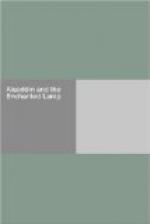[FN#443] Sic (kum),
[FN#444] Or “commission” (mishwar).
{FN#445] Bekia ma bekia hatha shey aleik, lit. “remaineth what remaineth this is a thing upon (or for) thee.” Burton, “Happen whatso may happen; the rest is upon thy shoulders.” The first bekia is perhaps used in the common colloquial sense of “then.”
[FN#446] Shekeraha wa istekthera bi-kheiriha. See ante, p. 155, note 3. Burton, “enhancing her kindly service.”
[FN#447] Surname of the ancient Kings of Persia, vulg. Chosroes.
[FN#448] Night DLXI.
[FN#449] Lit. “the.”
[FN#450] Burton, “the costliest of clothes.
[FN#451] Generally that of aloes-wood.
[FN#452] Quoth Shehrzad to Shehriyar.
[FN#453] Yetsunnuhu; quare a clerical error for yentsuruku ("had seen him” )?
[FN#454] i.e. male white slaves (memlouk, whence our “mameluke,” sing. for plural memalik).
[FN#455] Lit. “and let there be with each slave-girl a suit, etc.” Burton “And let every handmaid be robed in raiment that befitteth queens wearing.” The twelve suits of clothes to be brought by the slave-girls were of course intended for the wearing of Alaeddin’s mother; see post, p. 167. {see FN#457 in text}
[FN#456] i.e. the genuine Arabs of the unmixed blood.
[FN#457] See ante, p. 166, note 2. {see FN#455}
[FN#458] Likai telbesa (tetelebbesa ?) hiya. Burton, “she should wear.”
[FN#459] Sic, the meaning seeming to be that kings’ sons were out of comparison with Alaeddin, as who should say (in Cockney parlance, “Don’t talk to me about kings’ sons.”
[FN#460] Lit. “upon.”
[FN#461] El kendil el ajib.
[FN#462] Syn. “old and young.”
[FN#463] Night DLXII.
[FN#464] Ictedsa an tesmuha li bi, lit. “decided (or demanded) that thou be bountiful to (or grace) me with;” but icledsa is here used in the colloquial sense of “willed, vouchsafed.”
[FN#465] i.e. that of his tongue, lit. “its bounds or reach” (kheddahu). Burton, “passing all measure.”
[FN#466] Lit. “acquired, gotten, come by thee” (khetsitu bika).
[FN#467] Night DLXIII.
[FN#468] Nuweb (properly naubat).
[FN#469] Musica.
[FN#470] Acamou el fereh el atsim. Burton, “a mighty fine marriage-feast was dispread in the palace.”
[FN#471] Muashir.
[FN#472] Netser.
[FN#473] Lit. “but the behoving on me for her service engageth (or enforceth) me to apply myself “hereunto.”
[FN#474] i.e. at thy disposition.
[FN#475] Night DLXIV.
[FN#476] Tebakhin. Burton, “kitcheners.”
[FN#477] Keszr.
[FN#478] Wa, but quaere au ("or")?
[FN#479] Kushk.




